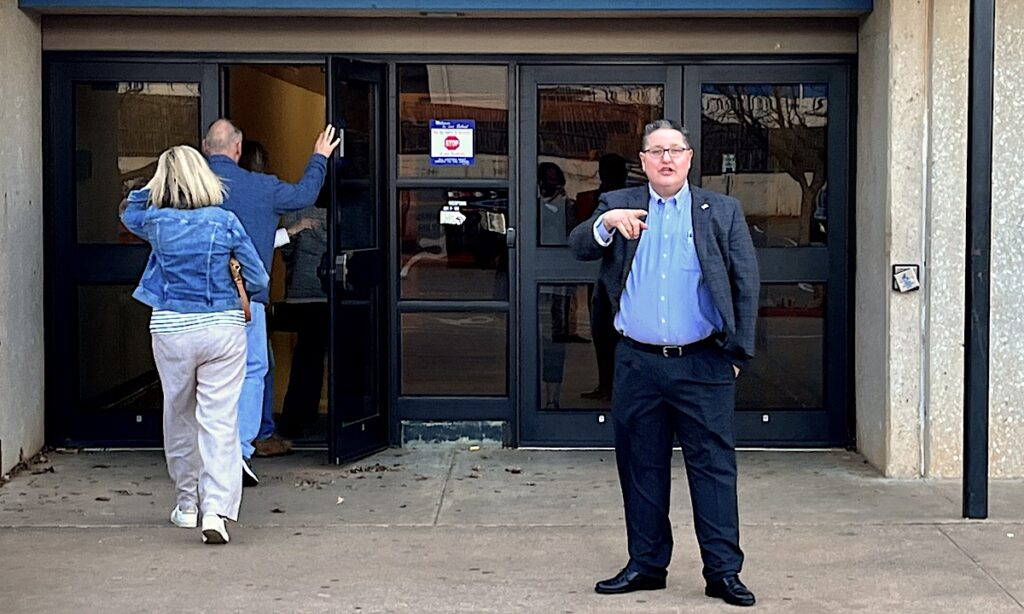

Edmond Public Schools is the defendant in three lawsuits that have garnered substantial media attention. One plaintiff alleges her daughter was inappropriately searched by a Heartland Middle School principal for suspicion of possessing a vape. Another parent recently sued the district after her daughter was involved in a fight with a transgender student in the Edmond Memorial High School girls’ restroom.
Additionally, EPS filed a petition in April for the Oklahoma Supreme Court to rehear Shellem v. Grunewald. The Oklahoma Supreme Court ruled 5-4 in March that EPS’ COVID-19 policy violated state law by requiring quarantines for unvaccinated students exposed to the virus.
This roundup chronicles where each party stands at this point in each case’s respective court process.
Kristal Trenkamp v. Edmond Public Schools

The mother of a former Heartland Middle School student alleges the school’s principal conducted an illegal strip-search on her daughter in May 2022 after she was accused of possessing a nicotine vape device.
The plaintiff, Kristal Trenkamp, alleges her daughter, a 14-year-old, was asked by Heartland Middle School Principal Veronica Johnson to lift her shirt, exposing her abdomen and the top of her boxers, and spin around. Later, she was asked to lift her shirt to where the bottom of her bra was exposed. In the petition, Trenkamp’s daughter is only identified by her initials.
Initially, Johnson waved a metal detection wand over the student’s bag and person before asking her to lift her shirt and spin, according to the petition.
After spinning, Johnson then asked the student about what she was wearing under her pants, according to the petition. Trenkamp’s daughter allegedly told both Johnson and a student resource officer who was present that she did not have a vape.
After hearing a beep while waving the metal detector over the student’s shirt, Johnson asked if she had an underwire in her bra. The student responded affirmatively. Johnson then told the student to lift her shirt up high enough that the bottom of her bra was visible, the petition states.
The search was conducted in a room “with an uncovered window that has a clear view to general access areas of the school,” according to the petition.
Another student who was also suspected of having vapes — and providing them to her classmates — was present during the incident. No vape device was found, the document states.
The plaintiff obtained the EPS student resource officer’s body cam footage of the incident, and the plaintiff’s attorney allowed NonDoc to review the video, which was consistent with the petition’s claims. The student initially started to raise her own shirt during the search, but put it back down. Then, the principal asked the student to raise her shirt.
After the search, Johnson warned Trenkamp’s daughter and the other minor student that possessing a vape could cause them to go before a judge or pay a fine. However, Johnson made no mention to the students about the health dangers of nicotine addiction.
EPS district policy states that “in no event shall a strip search of a student be allowed.”
“No student’s clothing, except cold weather outerwear, shall be removed prior to or during the conduct of any warrantless search,” the policy states.
Oklahoma law uses similar language.
“In no event shall a strip search of a student be allowed. No student’s clothing, except cold weather outerwear, shall be removed prior to or during the conduct of any warrantless search,” Title 70, Section 24-102 reads.
Edmond Public Schools, Heartland Middle School and Johnson are all listed as defendants in the case. In the district’s motion to dismiss brief, the City of Edmond is also listed as a defendant. Susan Parks-Schlepp, Edmond Public Schools’ director of communications, said the district cannot comment on ongoing litigation.
Trenkamp’s attorney, Shelby Shelton, said the vape-search incident was a clear violation of district policy and state law, and that no warrant was obtained prior to the search.
“This is a school, not a prison,” Shelton said. “Rights don’t stop at the door.”
The petition states “that a shirt does not constitute ‘cold weather outerwear,’ and the request to have [the student] raise her shirt, exposing her undergarments is not reasonably related to the objective of the search.”
EPS district policy and state law allow for superintendents, principals, teachers and security personnel to search students for “any dangerous weapons or, controlled dangerous substances, intoxicating beverages, low-point beer, or missing or stolen property that might be in their possession.”
Although no vape was found, Shelton said that point is moot, as students are never to be subjected to a search where they are asked to remove clothing other than heavy outerwear.
“We all want people to be safe. None of us want our kids not to be safe in schools. But here, there’s no gun, there’s no knife. We don’t have fentanyl,” Shelton said. “So, where is the danger or immediate threat?”
After the incident, Trenkamp received a voicemail from the school’s student resource officer, but the message only said the plaintiff’s backpack was searched. The search of her person was not mentioned. Shelton played the voicemail for NonDoc.
RELATED
State law to combat ‘pervasive’ teen vaping will supersede Edmond program by Joe Tomlinson
Trenkamp’s daughter attended classes online for a period of time after the incident, Shelton said. Her family is attempting to sell their house in an effort to move to a different school district, he said.
As national outlets began reporting on the matter, students from the student’s current and former schools have contacted her about the incident, Shelton said.
Five causes of action are listed in the amended petition: intentional infliction of emotional distress, negligence, negligence per se, assault, and invasion of privacy/invasion of seclusion.
In its responses to Trenkamp’s lawsuit, EPS says the principal acted in “bad faith” and that the district is not liable for such actions. The district also claims the case should be dismissed in its entirety, arguing that the plaintiff “has failed to plead compliance with the Governmental Tort Claims Act,” the district’s motion to dismiss states.
“It is well-settled that a plaintiff’s complaint must plead compliance with the GTCA to withstand a motion to dismiss,” the brief states. “Here, plaintiff has failed to make even a minimal factual allegation that she has fulfilled the requirements of the GTCA.”
Andrew Fugitt, EPS’ attorney, argues in the brief that the district cannot be held liable for Johnson’s actions that include an “essential bad faith or bad intent element,” as that “negates a finding that an employee has acted within the scope of her employment.”
“Since plaintiff can only recover against district for actions of its employees performed in good faith, any claim by plaintiff arising out of intentional, bad faith acts of its employee fails as a matter of law,” the brief states. “Accordingly, plaintiff’s claims of intentional infliction of emotional distress, assault, and intrusion of seclusion/invasion of privacy are based on the alleged intentional acts of Johnson and should be dismissed as to district.”
Further in the brief, Fugitt argues that the plaintiff’s cause of action for negligence should be dismissed, as Johnson acted under her own discretion in deciding to conduct the search.
“As to plaintiff’s claims of negligence concerning the alleged search of [the student], a school’s decision as to when and where a search can occur and how it should be completed are discretionary decisions exempt from liability under the GTCA because they are the result of the judgement of the individual completing the search,” the brief states. “Even if plaintiff disagrees with the judgement used by Johnson, her exercise of that judgment is discretionary, and plaintiff’s second cause of action should be dismissed.”
Fugitt also argues that the “negligence per se” cause of action should be dismissed, saying the plaintiff “failed to plead any of the requirements for establishing the cause of action, “including any allegation that [the student] suffered injury because of an alleged violation of Edmond Public School policy #4820 and/or [state statute].”
Theresa Gooden v. Edmond Public Schools

Meanwhile, the mother of a 15-year-old Edmond Memorial High School student filed a lawsuit against EPS in May claiming her daughter was attacked by a 17-year-old transgender student in the girls’ restroom. In the filing, her daughter is referred to by her initials.
The incident is alleged to have occurred at 7:15 a.m. on Oct. 26. The police report from the incident states that the officer saw “red areas on her face and both sides of her eyes began to swell.”
Theresa Gooden, the plaintiff, claims in the petition that EPS had Edmond police remove the transgender student from the girls’ restroom Oct. 21, to search for a weapon after the student made threats to her daughter. At that time, according to the petition, Gooden’s daughter told an Edmond Memorial High School assistant principal that the transgender student is biologically male and identifies as a female.
“Despite [Edmond Public Schools’] actual knowledge of the above, defendant allowed the male transgender student to continue using the girls’ bathroom, as opposed to requiring the male transgender student to use a bathroom that matched his birth certificate and/or paternity affidavit — boys’ bathroom — as required under (Oklahoma statute),” the petition states.
On May 25, 2022, Gov. Kevin Stitt signed SB 615 into law, which requires Oklahoma public school students to use restrooms that match the sex listed on their birth certificates.
According to the statute, districts that are found to be noncompliant with this law “shall receive a 5 percent decrease in state funding for the school district or public charter school for the fiscal year following the year of noncompliance.”
EPS Superintendent Angela Grunewald responded to media reports of the incident via via video Dec. 16, stating that the student accused in the fight had only been enrolled at Edmond Memorial High School for “a few days” prior to the incident and that no birth certificate was provided upon enrollment.
“When the student enrolled, the student enrolled as a female and presented themselves as a female, and so had been accepted as a female,” Grunewald said. “You may ask yourself, how can that happen? It’s hard to explain, but if a parent comes in and enrolls their child as a certain gender, and when you look at that child (and) by all social norms they look and present themselves as that gender — it’s not something that you would question.”
But in the EPD police report, the reporting officer noted that a birth certificate document did not list the student’s gender. However, the office wrote that a paternity affidavit in the student’s EPS file showed the student “was marked as being male.”
The district has not yet responded to the plaintiff’s petition.
“Because this matter is in litigation, there is little that can be said at this time,” Parks-Schlepp said when asked for a statement. “However, Edmond Public Schools is confident that when the facts are presented, it will be determined that the district fully complied with the law and acted in a reasonable manner.”
EPS files rehearing petition in Shellem v. Grunewald

In March, The Oklahoma Supreme Court ruled 5-4 in favor of a group of Edmond parents who argued Edmond Public Schools’ COVID-19 policy violated state law by requiring quarantines for unvaccinated students exposed to the virus.
But on April 17, EPS filed a petition for the Oklahoma Supreme Court to rehear the case, arguing that the court “based its opinion on an issue that was not preserved for appeal.”
Asked for a statement on the decision to file for a rehearing, Parks-Schlepp declined to comment.
“We respectfully choose to follow our long-standing policy of declining to comment on pending litigation,” Parks-Schlepp said in a statement.
Combs: CDC guidance serves as rational basis for quarantine policy
In their petition, filed in September 2021, three sets of EPS parents — including recent mayoral candidate Brian Shellem and his wife, Janelle — alleged that the district’s COVID-19 quarantine policy violated an Oklahoma statute, which states that public schools shall not “require a vaccination against coronavirus disease 2019 (COVID-19) as a condition of admittance to or attendance of the school or institution.”
The parents also claimed that the district’s COVID-19 policy violated their children’s 14th Amendment right to procedural due process and their children’s First Amendment right to freely assemble.
In a December order, Oklahoma County District Judge Don Andrews denied relief on all three counts pleaded in the petition, but he granted a temporary injunction based on the parents’ Equal Protection Clause argument and “enjoined EPS from implementing or enforcing” district policy. EPS appealed the decision to the Oklahoma Supreme Court.
In May 2022, Bryan Cleveland, then the deputy solicitor general at the Oklahoma Attorney General’s Office, filed an amicus curiae brief claiming that Andrews misinterpreted state statute with his decision.
Like Cleveland’s brief, the Oklahoma Supreme Court’s March ruling stated that Andrews “misinterpreted” the law, and “incorrectly concluded [the plaintiffs] were unlikely to succeed on the merits of their claim that the policy violates [the statute.]” Then, the Supreme Court ultimately ruled in favor of the plaintiffs.
However, EPS attorney Andrew Fugitt has filed a motion arguing that the case should be reheard, as the issue of whether the trial court erred in its ruling was never appealed by either party.
“Appellees did not appeal the trial court’s denial of their relief based on 70 O.S. § 1210.189(A)(1), and no party briefed the issue on appeal. The only issue presented to the court on appeal was whether district’s policy violated the equal protection clause of the U.S. Constitution,” the rehearing petition states.
Justice Douglas Combs made the same argument in his dissenting opinion.
“The parties did not preserve the issue for appellate review, and there is consequently no basis for the majority to render their judgment on appeal vacating the trial court’s temporary injunction and granting declaratory judgment in parents’ favor,” Combs opined.
Attorneys for the plaintiff argue in their response to the rehearing petition that EPS is ignoring “the court’s discretion to affirm a judgment on any rational theory, even when that theory was not the basis of the lower court’s decision.”
“The court did not reverse the trial court’s decision based on an issue not preserved for appeal or briefed by the parties, but instead affirmed the judgment based on a correct application of the law,” the response brief states.
Combs wrote that based on the equal protection clause, which was raised for appellate review, he would have reversed the trial court’s ruling.
“Faced with the issues actually presented in this appeal, I would have reversed the trial court’s temporary injunction because I do not believe parents would likely succeed on equal protection grounds,” Combs wrote. “The guidance from both the city-county health department and the CDC serve as a rational basis for the district’s implementation of a quarantine policy that differentiates between students who have either been vaccinated against or recently recovered from COVID-19 and students who have not.”
The Oklahoma Supreme Court may choose to rehear the case under its own discretion.





















